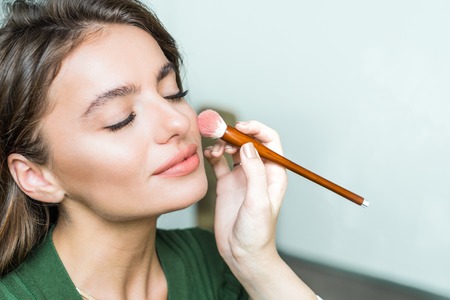1. Understanding Skin Changes in Your 20s
Your twenties are an exciting time of growth and self-discovery—but they also mark a turning point for your skin. While you may finally be saying goodbye to the acne-prone teenage years, new changes are starting to appear that might catch you by surprise. This decade is when the foundation for long-term skin health is truly built, and both diet and hydration play a bigger role than ever.
From Teenage Troubles to Adult Concerns
In your teens, oily skin and breakouts were likely your main concerns. But as you move into your twenties, hormones begin to level out, and you may notice fewer breakouts. However, this doesn’t mean your skincare journey is over—your skin starts to produce less collagen, and early signs of aging like fine lines or dullness can start to appear.
Common Skin Changes in Your 20s
| Skin Change | What It Means |
|---|---|
| Decreased Collagen Production | Skin begins to lose elasticity, leading to fine lines over time |
| Slower Cell Turnover | Skin may appear dull or uneven without proper care |
| Less Oil Production | You might experience drier skin compared to your teen years |
| Lingering Acne or Maskne | Hormonal fluctuations or lifestyle factors can still cause breakouts |
The Importance of Diet and Hydration
Now more than ever, what you put into your body shows up on your face. Eating nutrient-rich foods and staying properly hydrated helps support your skin’s natural glow, resilience, and healing ability. In your twenties, its essential to adopt healthy habits that can help reduce inflammation, maintain moisture balance, and protect against early signs of aging.
Quick Tips:
- Drink plenty of water: Aim for at least 8 cups a day to keep skin plump and hydrated.
- Eat colorful fruits & veggies: These are packed with antioxidants that fight skin damage.
- Add healthy fats: Foods like avocado, nuts, and salmon help maintain a strong skin barrier.
- Avoid excess sugar & processed foods: These can trigger inflammation and breakouts.
Your twenties are the perfect time to start being mindful of how food and water affect your complexion. With the right fuel, your skin can stay glowing and youthful for years to come.
2. The Connection Between Diet and Skin Health
What you eat has a direct impact on how your skin looks and feels—especially in your 20s, when your body is still balancing hormones and building long-term health habits. The right foods can give your skin a natural glow, while others might trigger breakouts or dullness.
How Food Affects Your Skin
Your skin is the largest organ in your body, and it reacts to the nutrients—or lack of them—in your diet. Foods rich in antioxidants, healthy fats, and essential vitamins help fight inflammation, support collagen production, and protect against environmental stressors like pollution and sun damage. On the flip side, diets high in sugar, dairy, or processed foods may cause inflammation and clogged pores.
Skin-Loving Nutrients to Add to Your Plate
If you want naturally glowing skin, try adding more of these nutrients to your daily meals:
| Nutrient | Benefits for Skin | Food Sources |
|---|---|---|
| Antioxidants (like Vitamin C) | Protects skin cells from damage and brightens complexion | Citrus fruits, berries, bell peppers, broccoli |
| Healthy Fats (Omega-3s) | Keeps skin hydrated and reduces inflammation | Salmon, chia seeds, walnuts, flaxseeds |
| Vitamin E | Protects against free radicals and supports skin healing | Almonds, sunflower seeds, spinach, avocados |
| Zinc | Aids in skin repair and helps prevent acne | Pumpkin seeds, chickpeas, lentils, cashews |
| Beta-Carotene (Vitamin A) | Helps maintain healthy skin cells and improves tone | Carrots, sweet potatoes, kale, butternut squash |
Tips for Eating Your Way to Better Skin
- Create colorful plates: Include a variety of fruits and vegetables to get a mix of skin-boosting nutrients.
- Add healthy fats daily: Don’t shy away from avocados or olive oil—they help keep your skin soft and supple.
- Avoid excess sugar: Try cutting back on sugary drinks or snacks that can spike insulin levels and lead to breakouts.
- Stay consistent: Healthy eating habits take time to reflect on your skin. Stick with it!
Your 20s Are the Perfect Time to Build Good Habits
The earlier you start feeding your body (and your skin) the right way, the better your long-term results will be. By focusing on nutrient-rich foods now, youre setting yourself up for healthy, glowing skin not just today—but for years to come.

3. Essential Nutrients for a Radiant Complexion
What you eat in your 20s can have a big impact on how your skin looks and feels. While skincare products help on the outside, real glow starts from within. Getting enough of certain nutrients can support clearer, more radiant skin. Let’s break down the most important ones and how to easily include them in a typical American diet.
Vitamin C: The Brightening Antioxidant
Vitamin C helps your body produce collagen, a protein that keeps skin firm and smooth. Its also a powerful antioxidant that protects against damage from sun and pollution.
Good Sources:
- Oranges and other citrus fruits
- Strawberries
- Bell peppers
- Broccoli
Easy Tips:
Add orange slices to your breakfast or snack on red bell pepper strips with hummus.
Zinc: The Skin Healer
Zinc supports skin repair and helps control inflammation and oil production, making it especially helpful if youre dealing with acne in your 20s.
Good Sources:
- Beef and chicken
- Pumpkin seeds
- Chickpeas
- Greek yogurt
Easy Tips:
Toss pumpkin seeds into salads or enjoy roasted chickpeas as a crunchy snack.
Omega-3 Fatty Acids: For Soft, Supple Skin
Omega-3s help keep your skin hydrated and reduce redness and dryness. They also support the skins barrier function, keeping moisture in and irritants out.
Good Sources:
- Salmon and other fatty fish
- Walnuts
- Flaxseeds
- Chia seeds
Easy Tips:
Add ground flaxseed to smoothies or oatmeal, or try grilled salmon for dinner once a week.
B Vitamins: For Even Tone and Texture
B vitamins—especially B2 (riboflavin), B3 (niacin), and B7 (biotin)—help maintain healthy skin by supporting cell regeneration and reducing inflammation.
Good Sources:
- Eggs
- Whole grains like brown rice and oats
- Almonds
- Leafy greens like spinach and kale
Nutrient Cheat Sheet for Glowing Skin
| Nutrient | Main Benefits for Skin | Easy Food Sources |
|---|---|---|
| Vitamin C | Cleans up free radicals & boosts collagen | Citrus fruits, bell peppers, broccoli |
| Zinc | Reduces inflammation & heals acne-prone skin | Pumpkin seeds, chickpeas, beef, yogurt |
| Omega-3s | Keeps skin moisturized & calm | Salmon, walnuts, chia seeds, flaxseeds |
| B Vitamins | Evens tone & supports cell turnover | Eggs, whole grains, leafy greens, almonds |
Your skin reflects what’s going on inside your body. By adding these key nutrients into your daily meals, youre not only fueling your overall health but also giving your complexion exactly what it needs to glow naturally in your 20s.
4. Hydration: Your Skin’s Best Friend
When it comes to achieving glowing skin in your 20s, drinking enough water is one of the simplest yet most effective habits you can build. Staying hydrated plays a huge role in keeping your skin looking fresh, smooth, and healthy from the inside out.
Why Hydration Matters for Your Skin
Your skin is your body’s largest organ, and just like any other part of your body, it needs water to function properly. Here’s how proper hydration supports your skin:
| Benefit | How It Helps Your Skin |
|---|---|
| Maintains Elasticity | Hydrated skin is more elastic, which helps prevent premature fine lines and sagging. |
| Reduces Dryness and Flakiness | Water helps keep your skin soft and smooth by preventing dehydration-related dryness. |
| Supports Detoxification | Adequate water intake helps flush out toxins that can lead to breakouts or dullness. |
| Improves Overall Appearance | Hydrated skin tends to look plumper, more radiant, and healthier overall. |
How Much Water Should You Drink?
A common guideline is to aim for about 8 cups (64 ounces) of water per day, but this can vary depending on factors like your activity level, climate, and body size. A good rule of thumb: if youre feeling thirsty or notice your lips are dry, its time to hydrate!
Tips to Make Drinking Water a Daily Habit
- Add Flavor: Infuse your water with fruits like lemon, berries, or cucumber for a refreshing twist.
- Create Triggers: Drink a glass of water after every bathroom break or before each meal.
- Cute Water Bottles Help: Keep a reusable water bottle with you at all times—bonus points if it matches your style!
- Set Reminders: Use phone alarms or hydration apps to remind yourself throughout the day.
- Eats Count Too: Don’t forget that foods like watermelon, oranges, and cucumbers also help with hydration.
Your Glow Starts With a Sip
Your 20s are the perfect time to build healthy skincare habits that last. Drinking plenty of water may not seem glamorous, but it’s one of the easiest ways to boost your skin’s natural glow every single day. So grab that glass—your skin will thank you!
5. Building Long-Term Habits for Healthy Skin
When it comes to achieving that natural glow in your 20s, quick fixes just won’t cut it. Glowing skin is the result of consistent care, and that starts from within—with what you eat and how well you stay hydrated. Here are some easy-to-follow strategies to help you build sustainable eating and hydration habits that support radiant skin now and in the future.
Eat a Rainbow Every Day
Your skin thrives on vitamins, minerals, and antioxidants found in colorful fruits and vegetables. Aim to fill your plate with a variety of colors each day. Heres a simple guide:
| Color | Example Foods | Skin Benefits |
|---|---|---|
| Red | Tomatoes, Strawberries, Red Peppers | Rich in lycopene and vitamin C for collagen production |
| Orange/Yellow | Carrots, Sweet Potatoes, Mangoes | Beta-carotene helps protect against sun damage |
| Green | Kale, Spinach, Avocados | Packed with vitamins E and A for hydration and repair |
| Blue/Purple | Blueberries, Eggplant, Grapes | High in antioxidants that fight skin-aging free radicals |
Hydrate Like You Mean It
Your body—and your skin—is made up mostly of water. Drinking enough water keeps your skin plump, clear, and glowing. A good rule of thumb is to aim for at least 8 cups (64 oz) of water daily, but your needs may vary based on activity level or climate.
Tips to Stay Hydrated Daily:
- Carry a reusable water bottle: Make it a habit to take sips throughout the day.
- Add flavor naturally: Infuse your water with lemon, cucumber, or berries if plain water gets boring.
- Eat hydrating foods: Watermelon, cucumbers, oranges, and celery all help boost hydration.
- Create reminders: Use phone alarms or apps to remind yourself to drink regularly.
Create Simple Meal Routines That Work for You
You don’t need a complicated diet plan to nourish your skin—just consistency. Try building meals around whole foods like lean proteins, healthy fats, whole grains, and fresh produce. Here’s an example routine you can tweak based on your lifestyle:
| Meal | Simple Idea |
|---|---|
| Breakfast | Oatmeal with chia seeds, almond butter, and berries |
| Lunch | Grilled chicken salad with leafy greens, avocado, cherry tomatoes & olive oil dressing |
| Dinner | Baked salmon with quinoa and roasted veggies like sweet potatoes & broccoli |
| Snacks | Greek yogurt with honey or hummus with carrot sticks |
Make It a Lifestyle, Not a Chore
The key to long-term success is finding what works best for you. Focus on progress over perfection. Start small—maybe by adding one extra glass of water per day or swapping one processed snack for fruit—and build from there. These tiny changes add up big-time when it comes to keeping your skin glowing throughout your 20s and beyond.
Your Glow-Up Starts Now!
The earlier you start building healthy eating and hydration habits, the better your skin will look down the road. Think of it as investing in your future glow—one bite (and sip!) at a time.


